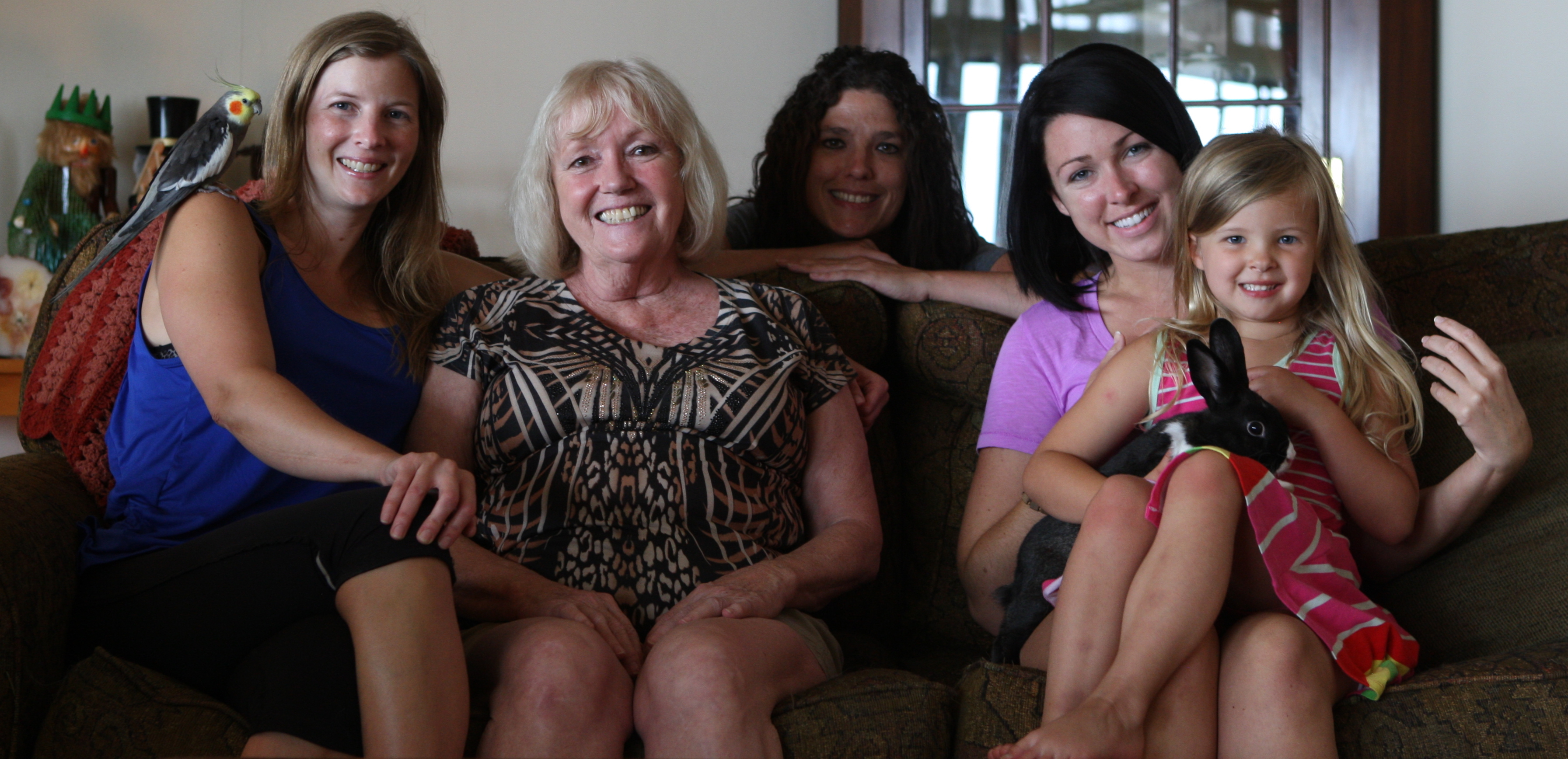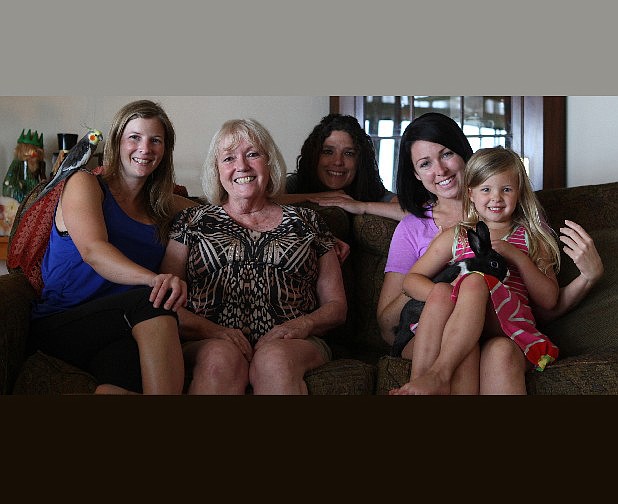 Katie Benson, at left, is a part-time caregiver for her mom, Mary Jo Noonan, second from left, whose hip-replacement surgery has left her unable to perform some everyday tasks. Benson gets a helping hand from friends Jennifer Hunt, in center, who helps clean Noonan's house, and Kaityln Maloney, second from right, who watches Benson's daughter, Lydia Benson, at right, while Benson helps her mom.
Katie Benson, at left, is a part-time caregiver for her mom, Mary Jo Noonan, second from left, whose hip-replacement surgery has left her unable to perform some everyday tasks. Benson gets a helping hand from friends Jennifer Hunt, in center, who helps clean Noonan's house, and Kaityln Maloney, second from right, who watches Benson's daughter, Lydia Benson, at right, while Benson helps her mom.It was love at first sight.
"We met next to a beer keg in the winter of 1969 at a fraternity party at the University of Tennessee," says Chattanoogan Diane Pitzl, recalling the first time she saw Gary Pitzl, the 6-feet, 4-inch man she would marry two years later. "I was a sophomore; he was a senior. He took my breath away."
They looked forward to a long and happy life together, and for the next 24 years, it was pretty much that. Then in 1998, just days before he turned 51, Gary was diagnosed with early onset Alzheimer's disease. Until his death in 2003, Diane became more than a wife to her husband; she became an around-the-clock caregiver.
Staci Pomeroy, community service representative at Home Instead Senior Care in Chattanooga, a home-care service, says nearly one-third of adults living in the Chattanooga area are, in some fashion, caregivers. Many of these caregivers, especially women, are at risk for many types of physical and mental stress when caring for a loved one, she says.
Because caregivers desperately need help, Pomeroy says Home Instead Senior Care, serving Hamilton, Bradley and Marion counties, has launched the Family Caregiver Stress Relief program.
Included in this program are online tools designed to help family members recognize their role as caregivers and help them determine if they are at risk for caregiver distress, a condition that can lead to depression, heart disease, high blood pressure and obesity.
The information is available at familycaregiverstressrelief.com or by calling 888-864-7666.
Agingcare.com reports that roughly 30 percent of caregivers die before those they are caring for.
"Some studies show deaths higher," according to the website. "Illness that doesn't lead to death is rampant -- depression and auto-immune diseases are high on the list. Caregivers often don't find time to go to their own doctor appointments. They put them off, because they are too busy or are just plain sick of sitting in clinics with their loved ones."
Pitzl says she never considered asking for help when caring for her husband.
"I couldn't leave him alone, and I realized my world had suddenly become very, very small," she says. "At first, my whole house was my world until it got dangerous for him to walk up and down stairs. Then my world became our upstairs."
Most of the burden of caregiving falls on women, according to the National Center on Caregiving, which estimates that 59 percent to 75 percent of caregivers are female. However, research suggests that the numbers of male caregivers may be increasing and will continue to do so due to a variety of social demographic factors.
"While some studies show a relatively equitable distribution of caregiving between men and women, female caregivers spend 50 percent more time providing care than male caregivers," says a report by the agency. "Among caregivers (age) 75-plus, both sexes provide equal amounts of care. Other studies have found that women caregivers handle the most difficult caregiving."
Pomeroy says that in her nearly 20 years of working in a nursing home and nonmedical care company, she has seen the woman as the typical caregiver.
"Women have more of a nurturing role in the family from taking care of their children to taking care of an aging parent," she says.
Learning Process
Pitzl says she learned to be a caregiver by trial and error.
"It was never easy. I remember one time I had just finished helping him in the shower, and I was trying to get him dressed. I had taken him to the bed and was trying to put on his underwear and pants. He could still walk at that point, so I kept trying to get him to stand up so I could pull up his pants. He just looked at me and wouldn't stand up. I became more and more frustrated. I stomped my foot like a 2-year-old, screaming, 'Stand up, stand up, stand up.' It was hard to lift him because he was so tall (she's 5-foot-7). So, I walked into the hallway, took two breaths, walked back in and said, very sweetly, 'Stand up.' And though he did, I realized I was completely exhausted."
Even when she slept, she was on duty, she says. "He would fall out of the bed. Sometimes I'd put a pillow under his head, cover him with a blanket, and I'd lie down beside him on the floor."
About nine months before her husband's death, Pitzl admitted to herself that she needed help. By then, he qualified for hospice care, so for up to a couple hours a day every week, either a nurse or an aide provided medical and nonmedical assistance. Though Pitzl welcomed the relief, she rarely left her husband's side.
It wasn't until a couple months after his death that Pitzl saw photographs of her that were taken while she was caring for her husband.
"I couldn't believe how tired I looked," she says. "In some photos, I didn't even look like myself."
Looking back, Pitzl says she wouldn't hesitate to ask for help much earlier than she did.
"It never crossed my mind at the time," she says. "I knew I was going to care for him as long as I was physically able. I took it one day at a time and did what I had to do for that day and get up the next day and do it again. I realize now that I needed to take time for myself."
Nonmedical needs
Nonmedical care companies provide services ranging from cooking light meals to housecleaning, and some will even bathe clients, offering caregivers a much-needed break.
"Not only does it help the caregiver, but it helps the loved to have the stimulation from an outside source as well as from the family and caregiver," Pomeroy says.
Home Instead Senior Care is the largest nonmedical senior care program in the world, with 1,000 franchises in all 50 states and 17 countries, according to Pomeroy. It also operates 13 websites filled with information for caregivers and will mail information to people who don't have the Internet, she says.
The company offers ongoing educational caregiving classes. One of the most popular, she says, is a family caregiver training class held 2-4:30 p.m. on the third Thursday every other month.
"We call it our Alzheimer's family caregiving class, but it's really beneficial for any caregiver," she says. "Because Alzheimer's is becoming more and more frequent, we're moving to make it become a monthly meeting."
Care takes a toll
Pomeroy says it was her own experience as a caregiver -- she looked after her mother during a four-month illness before her death -- that led her to change jobs.
"I didn't go back to my medical career in a nursing home because I realized the need for nonmedical care when I was taking care of my mom. Even though I was only in my 40s at the time, the stress was affecting my health. I put my mom before myself, and that's what most family members do."
It's natural to want to take care of your loved ones, Pomeroy says.
"We love them and we can give them what an outside caregiver can't -- love. But we will reach a point where it starts to affect our own health. We need help," she says.
Katie Noonan Benson of Hixson says help from her husband, Tom Benson, was vital when she took over the care of her ailing grandmother, who died last January.
"He was a huge part in my grandma's care as he could lift her better and help with changing and baths," says the 31-year-old massage therapist.
Katie Benson says caregivers need to ask for help as soon as they think they can't do it alone.
"Ask for help even when you're not sure," she says. "Sometimes it starts out with needing just a little help and grows into more. Never be scared to ask for help."
Benson says she's now offering caregiving services to her 68-year-old mom, whose hip-replacement surgery has left her unable to perform some everyday tasks.
"I realized with my grandma, and now with my mom, that simple things like cleaning, lawn care, keeping someone company, is a service caregivers and their clients appreciate."
Because of that, Benson is in the process of starting a company, Good Life, where services will include child and adult care, cleaning, yard work, cooking and odd jobs.
"We will customize our hours to what our clients needs are, whether it's to just hang out and talk, go to the store, run errands, cleaning the house and caring for the client," she says. "And we'll work with all ages and needs."
Contact staff writer Karen Nazor Hill at khill@timesfreepress.com or 423-757-6396. Follow her on Twitter at twitter.com/karennazorhill. Subscribe to her posts on Facebook at www.facebook.com/karennazorhill.
